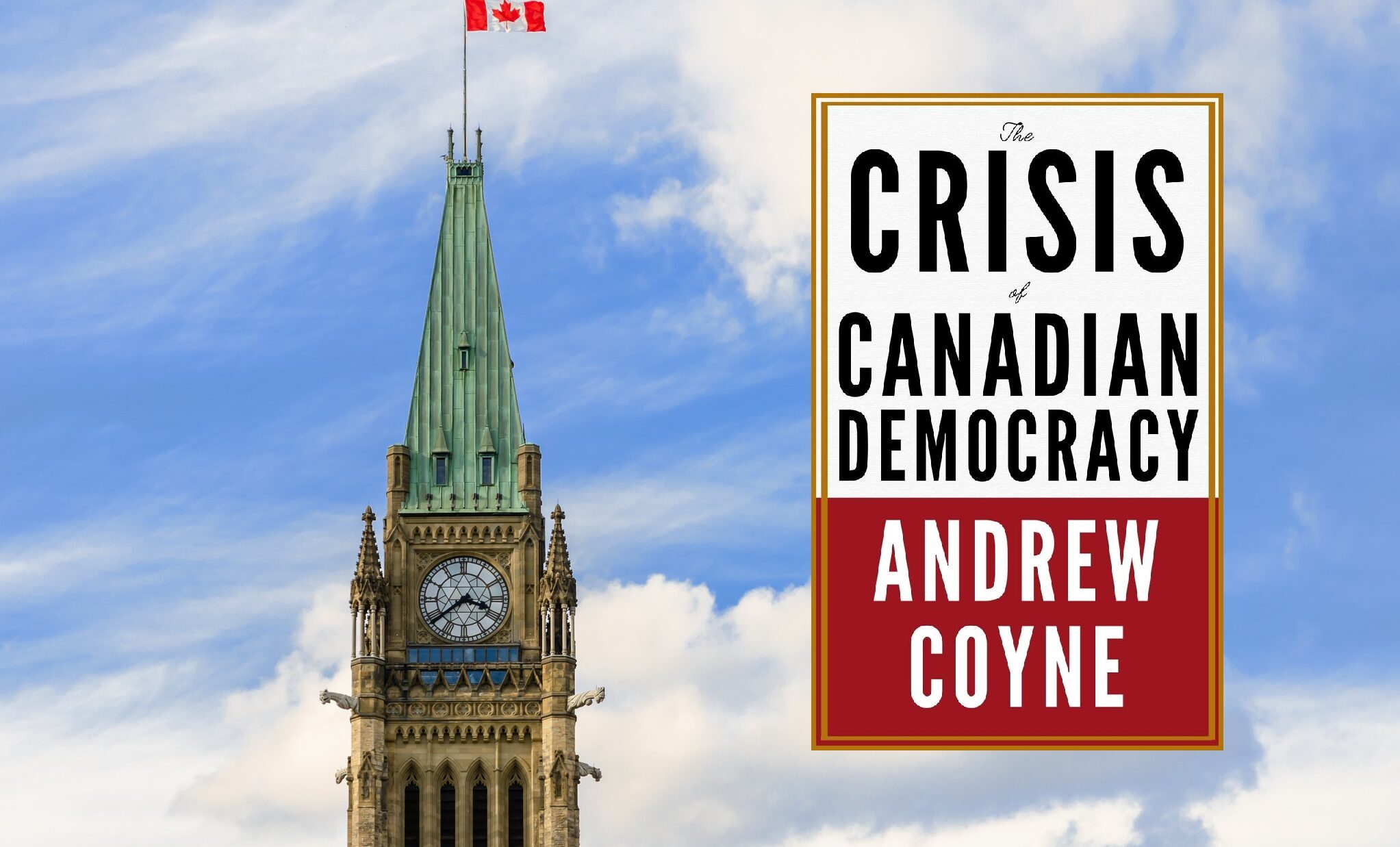

Will the 21st century be marked by the flourishing of democracy or its decline? The latter seems more likely, according to Andrew Coyne’s latest book, ”The Crisis of Canadian Democracy“ (Sutherland House). The word “crisis” can be overused, but it is warranted here.
Canadians tend to level criticism at places farther afield, yet fail to see the flaws in our own institutions. As Coyne writes, despite worrying trends elsewhere in the world, “we do not live in the system we think we do.” Indeed, there are plenty of flaws in Canada that need addressing: less-than equal representation, low voter turnout, a highly centralized executive, a castrated cabinet, and paltry levels of democratic discourse. Coyne’s list is exhaustive.
In just under 250 pages, Coyne charts the devolution of our democracy from its high-minded Victorian origins, redolent of an Anthony Trollope novel, to something approximating George Orwell’s totalitarian, unaccountable government in “1984.” Canada, according to Coyne, has become a democracy in name only, increasingly characterized by top-down control: too many discretionary powers for prime ministers, too many omnibus bills, and too much applause in question period (a gaudy symptom of a party discipline disease to which all of our MPs have apparently fallen victim).
Coyne says that the level of party discipline in Canada is the highest in the Anglosphere, forcing MPs to get behind their leader no matter what they actually might think about a given policy. This, he argues, is bad for everyone: for the prime minister who locks himself in an obsequious echo chamber, for the MPs who go all the way to Ottawa only to do someone else’s bidding, and for Canadian voters, who end up electing a partisan mouthpiece instead of a considerate representative of constituent views.
We also hold the record for having the biggest cabinet—Canada boasts more ministers than the U.K., Australia, or New Zealand, and more cabinet members than the United States. Each of these ministers draws a full government salary, meaning Canadians don’t just have more members of cabinet than other English-speaking democracies, but we pay a premium for the privilege.
Coyne lays the blame for both of these aberrations squarely on our prime ministers, who sign off on a candidate’s nomination papers (stick) and dangle the allure of cabinet postings in front of caucus to get their way (carrot). Thus, the PM has a unique ability to coax his parliamentarians into supporting his agenda and keeping him in power. Contrast this, writes Coyne, with the way party leaders are booted from office with stunning regularity in both Britain and Australia. (Comparing Canada to Britain and Australia is something Coyne does frequently in this book.)
Nomination papers and cabinet postings aren’t the PM’s only prerogatives. The prime minister gets to advise the monarch on whom to pick for governor general and advises the GG on whom to appoint to the Supreme Court and the Senate. The PM also offers advice on the appointment of the RCMP’s commissioner. If that doesn’t sound like concentration of power or cause for concern, then Coyne’s book might not be for you. If, however, you like having rose-tinted spectacles unceremoniously knocked off the bridge of your nose, Coyne will not disappoint.
Some of the grievances the book raises will hardly surprise readers. For example, the Senate gets a good walloping, but many of the finer details of our democracy also draw Coyne’s ire: election spending rules, the opacity of nomination contests, and the provinces’ increasing abuse of the Charter of Rights and Freedom’s notwithstanding clause are a sample. While foreign interference gets little mention, others have focused solely on that subject at the expense of much of what Coyne brings to light here. Still, one cannot have a conversation about Canadian democracy without discussing foreign interference, and Coyne could have devoted an entire chapter to this issue.
If there is one theme that pervades the book, it is that too few Canadians are talking about the myriad issues facing our democracy, and fewer still are properly outraged by them. This is certainly contributing to our democracy’s decay. The other source of our woes, however, is missing from an otherwise comprehensive diagnosis by an astute political observer: Canada’s politics altogether lacks character. Coyne humbly suggests that our political parties and our first minister need a few more rules to follow, but I’m skeptical that any amount of rules will ever substitute for good manners. Despite the fact that his book details a number of flagrant abuses of both convention and the law, Coyne is unconvincing when he implies that more laws can rein in bad people.
Our Westminster parliamentary system works best when it is steered by individuals of untarnishable character. It is no coincidence that much of our proceedings are the result of convention rather than law—honourable governors know where the lines are, and even with no one else to hold them to account will strive to conduct themselves admirably. It is obvious that in the decades since confederation, Canada has forfeited this ideal.
An adage says that we get the leaders we deserve. Yet Coyne reminds us that only an elected government can make the necessary democratic reforms to our government. Thus, Canada needs leaders that prize democratic ideals above self-interest to right the ship. If Coyne were a little braver he’d just come out and say it: good politics requires good morals, something many of our elected officials aspire to, but generally seem to lack.
In sum, “The Crisis of Canadian Democracy” illuminates some dark corners in what Coyne convincingly argues is a flagging democracy. His analysis is detailed, readable, and brimming with suggestions to reverse the rot at the heart of our institutions. All Canadians who want to understand their government better and ask more of it in future should consider giving it a read.
Danny Randell is a researcher at the Aristotle Foundation for Public Policy.
Like our work? Think more Canadians should see the facts? Please consider making a donation to the Aristotle Foundation.
SUBSCRIBE TO OUR NEWSLETTER
